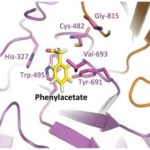 Researchers at the Department of Energy’s Joint BioEnergy Institute (JBEI) and Lawrence Berkeley National Laboratory (Berkeley Lab) have discovered a new enzyme that will enable microbial production of a renewable alternative to petroleum-based toluene, a widely used octane booster in gasoline that has a global market of twenty nine million tons per year. A major goal of JBEI is to provide a scientific basis for the development of industrially and commercially relevant fuels and chemicals from renewable resources, such as lignocellulosic biomass, rather than from petroleum. The enzyme discovered in this study will enable the first-time microbial production of bio-based toluene, and in fact, the first microbial production of any aromatic hydrocarbon biofuel.
Researchers at the Department of Energy’s Joint BioEnergy Institute (JBEI) and Lawrence Berkeley National Laboratory (Berkeley Lab) have discovered a new enzyme that will enable microbial production of a renewable alternative to petroleum-based toluene, a widely used octane booster in gasoline that has a global market of twenty nine million tons per year. A major goal of JBEI is to provide a scientific basis for the development of industrially and commercially relevant fuels and chemicals from renewable resources, such as lignocellulosic biomass, rather than from petroleum. The enzyme discovered in this study will enable the first-time microbial production of bio-based toluene, and in fact, the first microbial production of any aromatic hydrocarbon biofuel.
The toluene-synthesizing enzyme discovered in this study, phenylacetate decarboxylase, is of interest from a fundamental biochemical perspective as well as for its potential application to biofuels. The novel enzyme belongs to a family of enzymes known as glycyl radical enzymes (GREs), which catalyze chemically challenging reactions under anoxic conditions. Scientists only began to recognize GREs in the 1980s, and phenylacetate decarboxylase is just the eighth known GRE reaction type to have been discovered and characterized since then.
Results from the study led by Harry Beller, Berkeley Lab senior scientist and scientific lead at JBEI, were published in Nature Chemical Biology. The other lead co-authors are Andria Rodrigues and Kamrun Zargar. Other authors include MBIB’s José Henrique Pereira and Paul Adams, JGI’s Susannah Tringe and BSE’s Chris Petzold and Jay Keasling. Read more in the Berkeley Lab News feature article.

